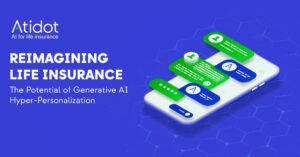Online customer acquisition costs are high for many industries, and the life insurance industry is no exception.
Insurance companies are currently examining their digital platforms and customer journey and searching for new ways to decrease their cost of acquisition (CAC). Many are turning to AI technology for help.
Artificial intelligence (AI) solutions use data to understand the correlations between different parameters for taking action and solving problems. Data is becoming increasingly important as companies look for new ways to understand their customers and create better marketing campaigns.
By leveraging AI models, companies can better segment audiences and generate highly personalized ad campaigns. AI models and machine learning capabilities leveraging industry data can provide ‘superpowers’ in social campaigns. Advanced AI and predictive technology can accelerate and help marketing campaigns target the right audience with the right message at the right time. Yes, we know Facebook, Google, and other social platforms are experts in this field. However, insurance companies hold the most relevant data about their customers and need to figure out a quick way to understand and monetize it.
Additionally, cross-channel marketing ensures that the data gathered from all channels is used effectively and efficiently. Using AI models trained with industry data enables insurance companies with strong digital capabilities to build highly effective advertising campaigns to reach the right people with the right message.
These models have been shown to accelerate social campaigns allowing them to scale up, dramatically* reducing the cost of acquisition (CAC), improving campaign performance, and helping digital operations grow significantly.
Any edge a company can gain in an increasingly competitive market is essential, and insurance companies that adopt new technologies, especially at the point of sale, will benefit more than others.
*CAC reduction of 60-90% has been achieved by applying AI Modules. AI in life insurance offers the chance to increase revenue, improve efficiency, and reduce risk. As AI becomes more sophisticated and pervasive, those insurance companies that adopt it will prevail in this competitive landscape.



 min read
min read 
 min read
min read

 min read
min read



